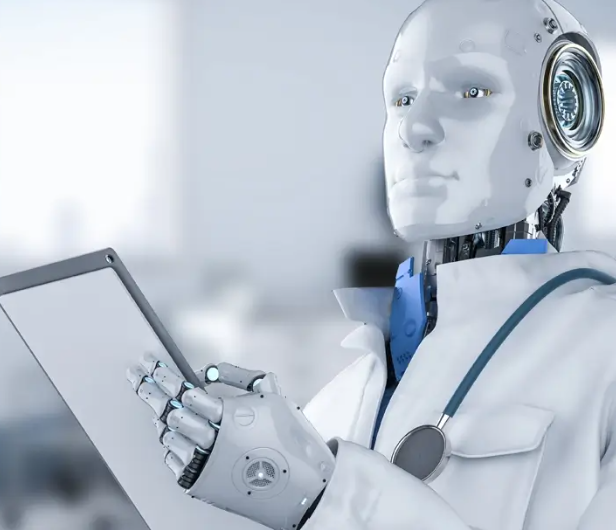Why AI is not intelligent at all, and therefore can’t speak, reason, hallucinate, or make errors
(This is a slightly extended version of my June column as “der Wissenschaftsnarr” in the German Laborjournal: “Kritik der schwätzenden Vernunft“)
The ongoing debate whether ChatGPT et al. are a blessing for mankind or the beginning of the reign of the machines is riddled with metaphors and comparisons. The products of Artificial Intelligence (AI) are “humanized“ by means of analogy: They are intelligent, learn, speak, think, reason, judge, infer decide, generalize, feel, hallucinate, are creative, (self-)conscious and make errors, are based on neuron-like structures, etc. At the same time, functions of the human brain are described using terms like computer, memory, storage, code, algorithm, and we are reminded that electric currents flow in the brain, just like in a computer. Befuddled by the astounding achievements of chatting and painting bots, many now argue that generative AI displays features of “real” intelligence, and that it is just a matter of more programming and time until AI surpasses human cognition.
The camp of those who think AI is intelligent proves its point with a long list of what AI can do that all look pretty intelligent. The doubters, however, are not convinced; they complain that AI still lacks certain “functionalities” of intelligence, following Tesler’s theorem: “AI is whatever hasn’t been done yet.”
In the following, I will argue that the current AI debate is missing the point, completely. Instead of simply marveling at AI’s putative intelligence, we should ask what intelligence, thinking, language, consciousness, etc. actually are – to measure AI against them.
Continue reading →







 As long as the majority of the population is not immune to SARS-COV2, the health care system must be protected from collapse due to overload with COVID patients. Therefore, for the past year, we have been testing measures ranging from increased hand washing to total lockdown with some success. Measures are introduced, tightened, relaxed, or abolished, only to be reintroduced, … and so it goes. Politicians justify their actions with incidence values, utilization of hospitals, model calculations and the advice of experts (see also here in my blog). Undeniably, many of these (anti)Corona measures have enormous plausibility. It is also trivial to realize that a total lockdown can severely limit the spread of a virus. However, this cannot be sustained forever. Therefore, the question of which of the measures from the black box lockdown have an effect, and for which the harm outweighs the benefit, is immensely relevant. With this knowledge, one might put together an evidence-based package of Corona measures that is less drastic than a lockdown, but just as effective. And perhaps in this way persuade some skeptics to participate. This is why the question of which evidence is available for the effectiveness of individual measures is so important. But beware.
As long as the majority of the population is not immune to SARS-COV2, the health care system must be protected from collapse due to overload with COVID patients. Therefore, for the past year, we have been testing measures ranging from increased hand washing to total lockdown with some success. Measures are introduced, tightened, relaxed, or abolished, only to be reintroduced, … and so it goes. Politicians justify their actions with incidence values, utilization of hospitals, model calculations and the advice of experts (see also here in my blog). Undeniably, many of these (anti)Corona measures have enormous plausibility. It is also trivial to realize that a total lockdown can severely limit the spread of a virus. However, this cannot be sustained forever. Therefore, the question of which of the measures from the black box lockdown have an effect, and for which the harm outweighs the benefit, is immensely relevant. With this knowledge, one might put together an evidence-based package of Corona measures that is less drastic than a lockdown, but just as effective. And perhaps in this way persuade some skeptics to participate. This is why the question of which evidence is available for the effectiveness of individual measures is so important. But beware.  Science gobbles up massive amounts of societal resources, not just financial ones. For academic research in particular, which is self-governing and likes to invoke the freedom of research (which in Germany is even enshrined in the constitution), this raises the question of how it allocates the resources made available to it by society. There is no natural limit to how much research can be done – but there is certainly a limit to the resources that society can and will allocate to research. So which research should be funded, which scientists should be supported?
Science gobbles up massive amounts of societal resources, not just financial ones. For academic research in particular, which is self-governing and likes to invoke the freedom of research (which in Germany is even enshrined in the constitution), this raises the question of how it allocates the resources made available to it by society. There is no natural limit to how much research can be done – but there is certainly a limit to the resources that society can and will allocate to research. So which research should be funded, which scientists should be supported? In this post I’ll be looking at the question of why scientific careers today depend so much on the Journal Impact Factor (JIF). And the acquisition of as much third-party funding as possible. Or, more generally, why the content, originality and reliability of research results are often a secondary matter when commissions talk their heads off about who to include in their own ranks. And who not. Or which grant applications deserve to be funded. In short, follow me on a brief and incomplete history of how and why we ended up judging the quality of science through proxies such as JIF and amount of third party funding. Perhaps a historical perspective will also yield clues as to how we can overcome this mess. But I am getting ahead of myself. Let’s start where it all began, with the founding fathers of modern science.
In this post I’ll be looking at the question of why scientific careers today depend so much on the Journal Impact Factor (JIF). And the acquisition of as much third-party funding as possible. Or, more generally, why the content, originality and reliability of research results are often a secondary matter when commissions talk their heads off about who to include in their own ranks. And who not. Or which grant applications deserve to be funded. In short, follow me on a brief and incomplete history of how and why we ended up judging the quality of science through proxies such as JIF and amount of third party funding. Perhaps a historical perspective will also yield clues as to how we can overcome this mess. But I am getting ahead of myself. Let’s start where it all began, with the founding fathers of modern science.  We all have been there: After a long wait and increasing tension, an email arrives from the editotial office. With an increasing heart rate we open the email. “Thank you for submitting your manuscript to our Journal. Your manuscript was sent for external peer review, which is now complete. Based on our evaluation and the comments of external reviewers, your manuscript did not achieve a sufficient priority for further consideration, and we have decided not to pursue your manuscript for publication. While we understand you may be disappointed with this decision, we hope the reviewer comments will help you revise your manuscript and submit it to another journal. Thank you for the privilege of reviewing your work.’ After the initial shock, we take a look at the reviews in the attachment. Reviewer 1 found the work quite good, some minor issues, all fixable, with well-meaning suggestions. But Reviewer 2! Has he even read the article? Did he confuse it with another paper on his desk? In any case, this unknown ‘expert’ was totally incompetent, but still dared to pour several pages of slurry over 3 years of our hard work and its highly relevant results.
We all have been there: After a long wait and increasing tension, an email arrives from the editotial office. With an increasing heart rate we open the email. “Thank you for submitting your manuscript to our Journal. Your manuscript was sent for external peer review, which is now complete. Based on our evaluation and the comments of external reviewers, your manuscript did not achieve a sufficient priority for further consideration, and we have decided not to pursue your manuscript for publication. While we understand you may be disappointed with this decision, we hope the reviewer comments will help you revise your manuscript and submit it to another journal. Thank you for the privilege of reviewing your work.’ After the initial shock, we take a look at the reviews in the attachment. Reviewer 1 found the work quite good, some minor issues, all fixable, with well-meaning suggestions. But Reviewer 2! Has he even read the article? Did he confuse it with another paper on his desk? In any case, this unknown ‘expert’ was totally incompetent, but still dared to pour several pages of slurry over 3 years of our hard work and its highly relevant results.